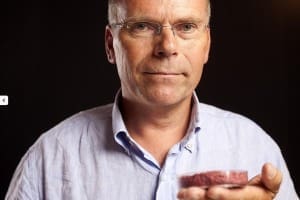Does lab grown beef pose a threat to Australian beef cattle production?
Dr Mark Post believes it does, simply because of the advantages it offers in terms of resource use.
“I think we seriously need to consider that this is going to be an alternative,” he told Beef Central at last Friday’s NTCA conference.
“Even if I am not going to do it, others will do it at some point. It is just too obvious a possibility.”
His message to the Australian beef cattle industry is simple: If you are not transparent, you cannot win the battle.
Transparency was essential to building consumer trust.
“Trust is dependent on transparency. People need to understand what you are doing, how you are producing your product, how you go from day to day business and actually provide food for everybody.
“This is a very honourable thing to do, to provide food to people, it is an extremely honourable thing to do and everybody should be proud of doing that and proud of telling your story of how you do that.
“So it has almost gotten into a shameful category of ‘I don’t want to talk about it because I feel there are sensitivities out there’.
“But we need to make consumers understand that their choices affect the business, and vice versa. And they can only understand it if you are transparent.”
Dr Post said the same rule applied to his cultured beef technology.
A major challenge will be how consumers react to it, and he said he was working to be as transparent as he can about his science to gain their trust.
“Whether you can develop a story in a way that people will really see the benefits and sort of overcome their initial reluctance (is the key),” he said.
“It is hurdle you have to take, I don’t think it will be a tremendous problem, it is just something that has some level unpredictability to it.”
Read more stories from the NTCA conference here
Dr Post said more scientists, industries and start-up companies were working on similar technology.
His own work was funded initially by the Dutch Government and more recently by one of the founders of Google, Sergey Brin.
In 2012, the year before Dr Post showcased his first lab grown burger, US animal rights group PETA offered a $1 million prize for the first scientist who could produce in-vitro chicken meat by March 2014.
The competition generated thousands of global media articles disseminating PETA’s views that meat production is wrong on animal welfare and environmental grounds and should be replaced by lab-produced alternatives. PETA ultimately earned the media coverage for its cause free-of-charge, because no scientist was able to produce a suitable in-vitro chicken product by the deadline and PETA did not have to pay out the $1m prize it had offered.
When Dr Post’s cultured beef burger began attracting international media attention in mid-2013, PETA appeared to claim credit for some of his work, stating that its prize offer had put in-vitro meat on the map and that it had sponsored Dr Post’s work.
However, when asked by Beef Central if his work was motivated in any way by the $1 million prize offered by PETA, Dr Post said that was not the case.
“Not at all, no, it did not affect us in any way,” he said
“In fact that challenge was focusing on chicken and I think for a good reason, if you think about animal welfare, you basically think about number of animals, and the number of animals involved in the poultry industry is obviously much, much bigger than in the cattle industry.
“So if your focus is animal welfare, then poultry is a good target.
“If your focus is more environmental and food security, then cattle would be a better target.
“My funder said if you really need the million (dollars) of that challenge I can provide it with you without the challenge.
““It was partly also a political decision, PETA as being an activist group in the past, more than it is right now, we don’t want to have too much of an association.”




We can tell it to the rooftops but if no one is listening, it makes it difficult. Bad news sells so much better than good. Couple that with the meagre budget we have to spend, we have to think up some cheap innovative ways of engaging the interest of urban Australia. Easier said than done.